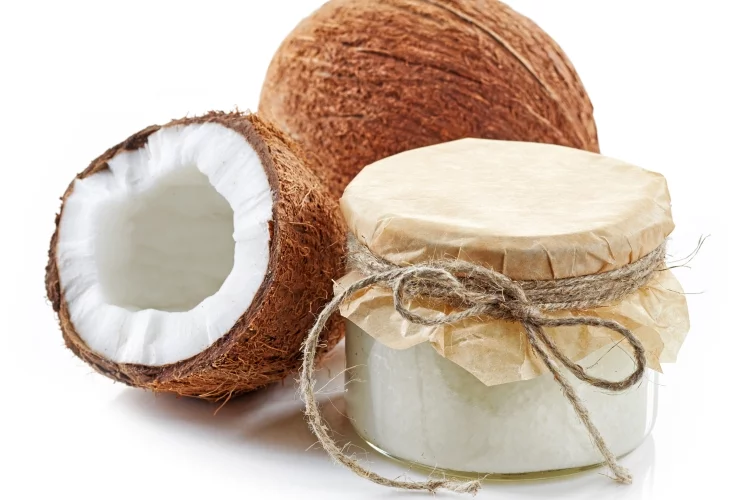by Daisy Dao
There are a lot of reasons to use coconut oil, but if you can't find it or just don't want to use it, there are substitutes. Olive oil, butter, and vegetable shortening all work well in recipes calling for coconut oil. You can also use a bit of applesauce instead of coconut oil in some cases. experimentation is key to finding the best substitute for your individual needs!
Contents

Coconut oil is a type of vegetable oil that is extracted from the meat of mature coconuts. It has a wide range of uses, including cooking, cosmetics, and even medicine.
The main component of coconut oil is medium chain triglycerides (MCTs), which are a type of saturated fat. Coconut oil also contains lauric acid, another saturated fat.
Despite its high saturated fat content, coconut oil has been shown to have several health benefits. For example, it can help improve cholesterol levels and reduce inflammation. Additionally, coconut oil can help boost weight loss when used in conjunction with a healthy diet and exercise program.
If you're interested in trying coconut oil, be sure to purchase virgin or extra-virgin coconut oil. This type of coconut oil has the highest concentration of healthy fats and is free from harmful chemicals.
When used in moderation, coconut oil can be a healthy addition to your diet. However, it's important to remember that coconut oil is still high in calories and should be consumed in moderation as part of a balanced diet.
When it comes to natural oils, few are as versatile or as beneficial as coconut oil. This unique oil has a host of uses, both internally and externally, that can improve your health in a number of ways. Here are just a few of the benefits of coconut oil:

It can help to moisturize and protect your skin, while also helping to reduce the appearance of wrinkles.
It can help to strengthen and condition your hair, while also providing it with a healthy shine.
It can also help to increase your energy levels and improve your overall health.
This means that it can help to reduce the swelling and pain associated with arthritis and other inflammatory conditions.
It can also help to reduce the risk of developing certain types of cancer.
As you can see, there are many benefits of coconut oil. If you are looking for a natural way to improve your health, then this unique oil may be just what you need. There are a number of ways to use coconut oil, so be sure to explore all of the options available to you. You may be surprised at just how beneficial this versatile oil can be.
There are a few situations when you might need to use a substitute for coconut oil. One is if you're baking and the recipe doesn't call for any other type of oil. In this case, you can use another oil such as olive oil or vegetable oil. Another situation is if you have a nut allergy and can't use coconut oil. In this case, you can use a seed oil such as pumpkin seed oil or sunflower oil. Finally, if you're trying to avoid saturated fat, you can use a plant-based butter such as Earth Balance or Melt.
If you're like many people, you probably think of coconut oil as a healthy, natural alternative to other oils. But what you may not know is that coconut oil can actually be quite unhealthy.
Here's why:
Coconut oil is high in saturated fat. In fact, it's about 90% saturated fat. That's more than twice the amount of saturated fat found in olive oil, and nearly as much as lard!
Saturated fat is known to increase your risk of heart disease, stroke, and other cardiovascular problems. It can also raise your LDL ("bad") cholesterol levels and decrease your HDL ("good") cholesterol levels.
So if you're looking for a healthy oil to use in your cooking, coconut oil is not the best choice. Instead, opt for an oil that's lower in saturated fat, such as olive oil or canola oil.
As we all know, coconut oil is extremely popular in the beauty industry. It's no surprise that this natural product has so many uses, given its healthy fatty acids and antioxidants. However, what you may not know is that olive oil can be used as a great substitute for coconut oil.
Here are some ways you can use olive oil instead of coconut oil:
You can use olive oil as a moisturizer for your face, body, and hair. Simply apply it to your skin or hair and let it soak in.
Olive oil makes an excellent shaving cream alternative. Simply apply it to your skin before shaving and enjoy a smooth shave.
Olive oil can also be used to remove makeup. Simply apply it to a cotton pad and wipe away your makeup.
If your hair is in need of some extra moisture, you can use olive oil as a hair mask. Simply apply it to your hair and let it sit for 30 minutes before washing it out.
So, there you have it! These are just a few ways you can use olive oil instead of coconut oil. Give it a try and see for yourself how well it works!
There are a lot of reasons why you might want to substitute butter for coconut oil. Maybe you're trying to reduce your intake of saturated fat, or you're looking for a dairy-free option. Whatever the reason, it's definitely possible to use butter as a replacement for coconut oil in many recipes.
Here are a few tips for substituting butter for coconut oil:
With these tips in mind, substituting butter for coconut oil in your favorite recipes should be a breeze!
Ghee is a clarified butter that is popular in Indian cuisine. It is made by simmering butter until the water evaporates and the milk solids settle at the bottom of the pan. The clear, golden liquid that remains is ghee.
Ghee has a higher smoke point than coconut oil, which makes it ideal for cooking at high temperatures. Additionally, ghee contains more saturated fat than coconut oil, which makes it more stable and less likely to oxidation.
Ghee can be used as a 1:1 replacement for coconut oil in any recipe. When substituting ghee for coconut oil, pay attention to the smoking point of your recipe to ensure that the ghee does not burn.
Additionally, because ghee contains more saturated fat than coconut oil, it will produce a richer flavor in your dish. If you are looking to cut back on the saturated fat in your diet, you can use a 50/50 mix of ghee and coconut oil.
There are many oils that can be used as substitutes for coconut oil, but one of the best options is avocado oil. Avocado oil has a similar composition to coconut oil, making it an ideal replacement in recipes. Additionally, avocado oil has a higher smoke point than coconut oil, meaning it can be used for cooking at higher temperatures. Finally, avocado oil has a milder flavor than coconut oil, so it won't alter the taste of your food too much. If you're looking for a coconut oil substitute, avocado oil is a great option.
A lot of people use coconut oil for cooking, but did you know that there are other oils that can be used as substitutes? Animal fat is one option that can be used in place of coconut oil.
Animal fat can be rendered from any animal, but the most common sources are pork and beef. Although it may not be as widely available as coconut oil, it can be a good option for those who are looking for an alternative.
One advantage of using animal fat is that it has a higher smoke point than coconut oil. This means that it can be used for cooking at higher temperatures without smoking or burning. Additionally, animal fat has a lower melting point, which makes it ideal for baking or frying.
Another benefit of animal fat is that it is a good source of saturated fat. This type of fat is beneficial for many reasons, including increasing HDL (good) cholesterol levels and supporting cognitive health.
If you are looking for a coconut oil substitute, animal fat is a good option to consider. It has a number of benefits and can be used in many different ways. Give it a try the next time you need an alternative cooking oil!
Coconut oil is a healthy, natural product that has many benefits. However, if you are unable to use coconut oil or do not like the taste of it, there are substitutes that can provide similar benefits. These substitutes include olive oil, avocado oil, and sunflower oil. Try using one of these oils in your cooking instead of coconut oil to enjoy its health benefits.
 |
 |
 |
 |
 |
 |
 |
 |

About Daisy Dao
Daisy grew up on the beautiful Honolulu island where she often found herself spending most of her day enjoying the ocean scent in sea waves. As such, Daisy came to appreciate the art of cooking seafood. She has experimented with baking, roasting, broiling, poaching, grilling (and every other cooking technique you can think of); and with all kinds of spices too. Now she is ready to present her experience: the art of cooking healthy food without any pre-packaged ingredients; food product recommendations for people who need a bit more guidance on what goes into their bodies; how to maintain an active lifestyle without having to give up your favorite foods!
Kitchen Goodness
Check for FREE Gifts. Or get our Free Cookbooks right now.
Disable the Ad Block to reveal all the recipes. Once done that, click on any button below
 |
 |
 |
 |